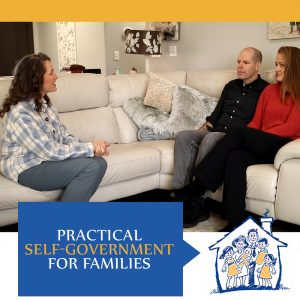Parenting with Grace
Children aren’t perfect, and neither are parents. However, parenting isn’t about being perfect. And, there’s no such thing as a perfect child. Of course, perfection isn’t the goal of my parenting anyway. My goal has always been to create joyful adults. Joyful adults are those that know what their mission in life is and they’re dedicated and eager to do what it takes to achieve this mission. They also have solid relationships with God and family.
The key to becoming joyful parents and joyfully parenting is learning how to parent with grace. There are two ways I practice grace during parenting. And in the process, it helps my children become who they’re meant to be.
Giving Hearts
The purpose of nurturing and guiding children is to train their hearts toward goodness. To touch the heart of a child, the parent’s heart must also be turned toward the child. In order for the child to trust the parent to guide his/her heart, there must be a feeling of goodwill and caring from the parent. How can parents maintain a soft heart while helping their child have a change of heart too?
To create an environment that feels safe for a heart to change, a parent must lead by principle — not by emotional reactions. Additionally, the parenting should be honest. This requires consistent, well-taught and predictable teaching. That includes proper correcting during interactions. But the most important part of creating a heart-changing atmosphere at home is keeping the parent’s heart in the right place.
This is important because people learn more from feeling than they do by logic. Logic is required to discover rational honesty in order to engage the will and brain in overcoming selfish desires and dangerous, uncharitable misconceptions. But it’s the feeling or tone that exists in any given situation that has the power to change the heart for the good… or bad.
So, to manipulate a heart you use controlling or fearful feelings. But to honestly transform a heart, you have to use genuine honest feelings. Yes, there are different kinds of feelings. There are dishonest, selfish feelings and there are honest, duty driven, charitable feelings. Real understanding, compassionate, service-oriented love — for instance — is a kind of feeling that makes us better people and lets others know they really matter to us. But, passion-driven, preference oriented, physical love is really only about one person wanting another to comply with them for selfish reasons, which is manipulative.
When a parent or a child has a genuine, heart-felt love for the other, then he/she gives their whole heart to the person, nothing wavering. This means they don’t talk in ways that attack others. They don’t think the worst of the other or gossip about the other. It’s this feeling of giving the whole heart that makes any teaching or accepting of a correction feel safe, honest and unified.
Grace Moments
Fully understanding and applying grace is a lifetime pursuit of mine. It’s more than can be taught in this short article. So, for this parenting lesson I’m going to focus on two aspects of grace that can be easily applied to our parenting moments:
- Seeing them through it.
- Giving them heart power.
First, seeing them through it could mean helping children through their life’s challenges as a loving, always-there-for-them support. Or it could mean no matter what behaviors we see on the outside; we should take the time to see the “real” them on the inside. Both of these applications are important for transforming our parenting moments into moments of grace.
I see so many parents emotionally turn against their children when the hard moments come. They feel the bed wetting, the teasing, the emotional barriers, and the attitude problems are too much to handle. As a result, parents then end up feeling frustrated and alone. Frustration and loneliness are two signs that the heart isn’t in the right place.
Home should always be the safest place to make mistakes. We must not take mistakes personally. If any mistake is okay to work through, then parents are properly supportive.
Seeing children through it also means seeing their true value despite their behaviors or mistakes. This is the most important focus a parent can have. When children don’t meet expectations, it’s easy to obsess over bad qualities and become bothered by the children. It’s not a parent’s job to focus attention on what they’ve done wrong as much as it is to focus attention on what they need to learn in order to do right. Both focuses require correction, but only one focus is productive.
Second, parents should focus on giving their child heart power. To really have grace is to share this heart power. This means a parent wouldn’t be content with keeping all the love, all the truth, all the correct behaviors, all the understanding, or all the attachment to themselves. Rather, they would willingly do all they can to help the child develop these strengths as well.
The best way to help others feel empowered to become their best is a process I think of as touching hearts. Every time a parent teaches their children about life, family, corrections that need to be made, and the purpose of it all, they must do it with heart. They look into their child’s eyes and think, “I love you. You are a great person who I feel privileged to teach. I love you.”
These thoughts come through, even when a parent is telling a child to do a chore or fix a mistake he/she has made. This feeling never stops. This is a feeling that never, ever gives up on the child — no matter how bad the choices are that the child makes. I know it’s easier said than done to feel this love during corrections. But trust me; it is possible.
It’s my goal to bring every interaction and relationship I have up to this level. The work is slow; and my imperfections are apparent. But, when I have moments that feel like parenting grace, I am motivated for a lifetime! Nothing can compare to the increased love I feel for my child and for God during these moments. For I know that without His love and understanding for me, I wouldn’t have enough power to show love to others in this way.
Parenting A House United: Changing Children Hearts and Behaviors by Teaching Self-Government is a book designed to help parents and children have a change of heart.
Index
- Analyzing, Assertive Communication, Calm, Changing Hearts, Character Building, Common Vision Creation, Connecting (Looking in the eyes), Correcting, Culture, Encouragement, Family Culture, Power of Calm, Power Struggling, Pre-Teach, Problem Solving, Relationships, Respect, Roles, Seek to Understand, Skills, Structure, Tone, Unity






